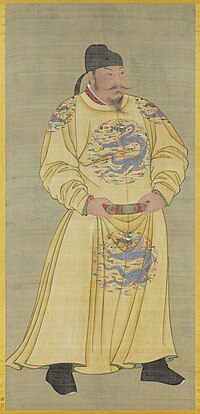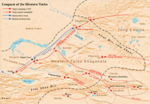Tuoba (Tabγač or Tabghach; also Taγbač or Taghbach; Chinese: 拓跋) is an extinct language spoken by the Tuoba people in northern China around the 5th century...
6 KB (400 words) - 17:24, 17 November 2024
(northern Early Middle Chinese/NEMC *kʰɨrbuwk) Tuan/Duan 段 (NEMC *dɔr̃) Tabghach Tuyuhun/T’u-yü-hun (Mu-jung/Murong 慕容) Kitanic (Yü-wen/Yuwen 宇文) Old Kitan...
4 KB (312 words) - 13:38, 18 December 2024
Wuhuan, and Xianbei peoples might have been related to Proto-Mongolic. For Tabghach, the language of the founders of the Northern Wei dynasty, for which the...
31 KB (3,300 words) - 21:32, 11 December 2024
derived from the Tabghach, an early medieval Xianbei clan and founders of the Northern Wei dynasty in China. The Old Turkic name Tabghach (Tuoba in Mandarin)...
38 KB (3,880 words) - 02:23, 16 December 2024
Mahmud 1132–1141 Ibrahim Tabghach Khan 1141–1156 Ali Chaghri Khan 1156–1161 Mas'ud Tabghach Khan 1161–1171 Muhammad Tabghach Khan 1171–1178 Ibrahim Arslan...
67 KB (7,664 words) - 17:38, 6 December 2024
Karakhanids, and Khwarazm. In early 1156, the Karluks killed Ibrahim Tabghach Khan, the Western Karakhanid ruler of Samarkand. Ibrahim was succeeded...
58 KB (6,778 words) - 12:39, 29 November 2024
1132–1141[clarification needed] Ibrahim Tabghach Khan 1141–1156 Ali Chaghri Khan 1156–1161 Mas'ud Tabghach Khan 1161–1171 Muhammad Tabghach Khan 1171–1178 Ibrahim Arslan...
26 KB (3,361 words) - 01:56, 15 November 2024
the Mongols. Later branches and descendants of the Xianbei include the Tabghach and Khitan, who seem to have been linguistically Para-Mongolic. [...] Opinions...
79 KB (9,240 words) - 01:11, 14 December 2024
name for China after the older Sinae and Serica: Taugast (Old Turkic: Tabghach), during its Northern Wei (386–535) period. The 7th-century Byzantine historian...
34 KB (3,822 words) - 19:59, 16 December 2024
of Heraclius (r. 610–641), wrote that Taugast (or Taugas; Old Turkic: Tabghach, from Tuoba, the Xianbei clan of Northern Wei), was a great eastern empire...
98 KB (12,801 words) - 00:48, 16 December 2024
Romans (i.e. Byzantines) derived a new name for China, Taugast (Turkic: Tabghach), during its Northern Wei (386–535) period. By the time of the Eastern...
25 KB (2,775 words) - 04:20, 18 December 2024
Eastern Romans acquired yet another name for China: Taugast (Old Turkic: Tabghach). Theophylact Simocatta, a historian during the reign of Heraclius (r....
116 KB (14,373 words) - 01:52, 15 December 2024
Karakhanids dies and Ibrahim Tabghach Khan succeeds him 1156 Ibrahim Tabghach Khan of the Western Karakhanids dies and Mas'ud Tabghach Khan succeeds him 1158...
17 KB (841 words) - 20:22, 1 September 2024
themselves as "Chinese emperor." "Khitay" was used by the Qara-Khitay, and "Tabghach" was used by the Qarakhanids. Later Arabian and Persian references to China...
218 KB (23,936 words) - 13:36, 17 November 2024
Samarkand, accepting the loyalty of Muslim nobles and appointing Ibrahim Tabghach Khan as the new ruler of Samarkand. 1158 - Khwarezm-shah Il-Arslan besieged...
16 KB (1,478 words) - 08:19, 19 September 2024
The Qarakhan and Qarakhitay khans held titles that identified them as Tabghach or Khitay, named after kingdoms in northern China. Tang architectural influences...
19 KB (2,061 words) - 02:59, 3 November 2024












